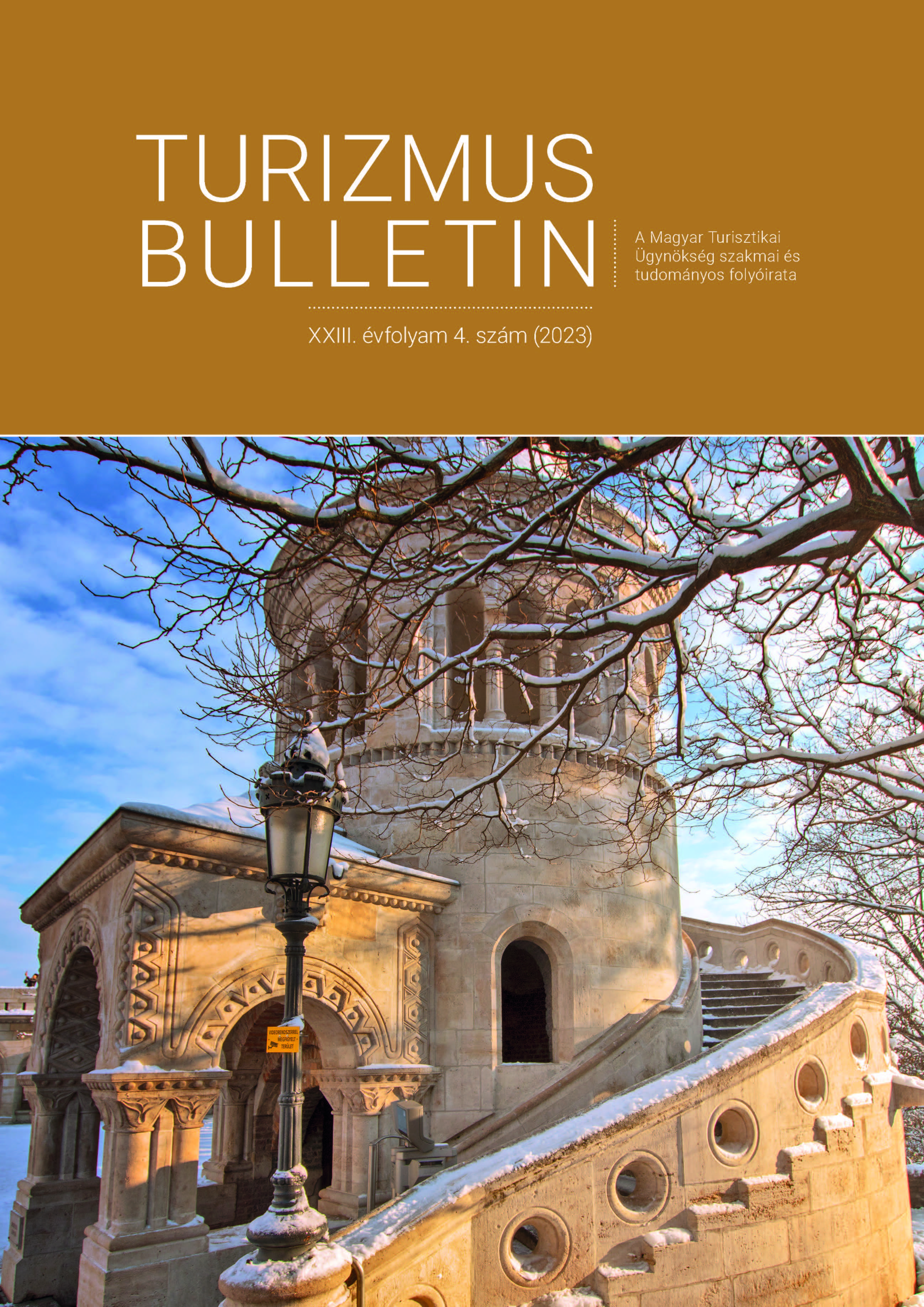Trends in the awareness and tourism demand of Tusnádfürdő, with a special focus on the guest composition, marketing and management activities of Fortuna Eco Boutique Hotel
DOI:
https://doi.org/10.14267/TURBULL.2023v23n4.6Keywords:
Transylvania, Tusnádfürdő, destination and hotel marketing, spatourismAbstract
The present study examines the current tourism situation and future development opportunities of the Tusnádfürdő settlement in Transylvania, with a special focus on the management and marketing activities of the Fortuna Eco Boutique Hotel. Tusnádfürdő is an increasingly popular destination for Hungarian tourists, partly because of the annual „Tusványos” Bálványos Summer Free University and Student Camp. This is also due to its traditional spa, natural beauty, developing infrastructure, tourist attractions and to some other activities, provided by the area for both domestic and foreign visitors. The exploratory research was carried out through an online quantitative survey in two languages (Hungarian and Romanian). Qualitative interviews with the mayor of Tusnádfürdő and the owner-manager of the Fortuna Eco Boutique Hotel were undertaken. All of these explored the current situation and tried to respond to the future challenges of both the municipality and the hotel.
References
BENEDEK J. (szerk.) (2011): Románia – Tér, gazdaság, társadalom. Kriterion Kiadó, Kolozsvár.
BUHALIS, D. (2000): Marketing the Competitive Destination of the Future. Tourism Management. 21(1). pp. 97–116. http://dx.doi.org/10.1016/S0261- 5177(99)00095-3
CIANGĂ, N. (2006): România: geografia turismului. Editura Presa Universitară Clujeană, Cluj-Napoca. DÖVÉNYI Z. (szerk.) (2016). A Kárpát-medence földrajza. Akadémiai Kiadó, Budapest.
HALL, C. M. (2008): Tourism Planning: Policies, Processes and Relationships. Pearson Education, London.
HORVÁTH Z. – MAGYAR-PAPP J. – MÓKUSNÉ PÁLFI A. (2016): A turisztikai térhasználat és a desztináció menedzsment összefüggései. Modern Geográfia. 11(4). pp. pp. 1–14.
LEIPER, N. (1990): Tourist Attraction Systems. Annals of Tourism Research. 17(3). pp. 367–384. https://doi.org/10.1016/0160-7383(90)90004-B
LŐRINCZ K. – SULYOK J. (szerk.) (2017): Turizmusmarketing. Akadémiai Kiadó, Budapest. PAPP-VÁRY Á. (2009): JPÉ marketing – Elmélet és gyakorlat józan paraszti ésszel. Századvég Kiadó, Budapest.
PISKÓTI I. (2016): Régió- és településmarketing. Akadémiai kiadó, Budapest.
STĂNCIOIU, A.-F. – BĂLTESCU, C. – VLĂDOI, A.-D. – PÂRGARU, I. – NICULA, V. (2011): Transilvania – microdestinaţie turistică a României. Economie teoretică şi aplicată. 18(5). 558. pp. 132–142.
SZÁRAY M. (2012): Történelem II. – Középiskolák, 10. évfolyam. Nemzeti Tankönyvkiadó, Budapest.
TOFAN, G-B. – NITĂ, A. (2014): Some actual aspects about the tourism accomodation in harghita county. GeoJournal of Tourism and Geosites. 14(2). pp. 158–167.
TUSNÁDFÜRDŐ TURIZMUSFEJLESZTÉSI STRATÉGIÁJA (2022) UYSAL, M. – JUROWSKI, C. (1994): Testing the Push and Pull Factors. Annals of Tourism Research. 21(4). pp. 844–846. https://doi.org/10.1016/0160- 7383(94)90091-4
VERES Z. – HOFFMANN M. – KOZÁK Á. (szerk.) (2017): Bevezetés a Piackutatásba. Akadémiai Kiadó, Budapest.
Internetes források
AUBERT A. (szerk.) (2011): Turizmus-menedzsment. Pécsi Tudományegyetem, Pécs. https://www.eturizmus. pte.hu/szakmai-anyagok/Turizmusmenedzsment/ book.html Letöltve: 2022. augusztus 4.
ERDÉLYSTAT (2022): Tusnádfürdő (Băile Tuşnad) – statisztikai adatlap. http://statisztikak.erdelystat. ro/adatlapok/tusnadfurdo/1394 Letöltve: 2022. augusztus 4.
HOTEL TECH REPORT (2022): „What Is a Boutique Hotel? A Clear Definition with Examples” https://hoteltechreport.com/news/boutique-hotel Letöltve: 2022. augusztus 4.

